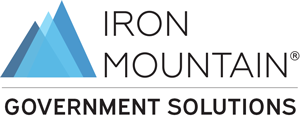Increasingly, we expect everything to be online and easily retrievable. But a surprising number of government records are still on paper, stored in dusty boxes and available only through manual search. What if your employees could readily search by keyword, or metadata points, to quickly locate key documents and records, even when remote? Now your data becomes a productivity asset.
“Records and information, whether they’re paper or digital, are the lifeblood of government,” said Mary Ellen Buzzelli, Director of State, Local and Education Strategy at Iron Mountain Government Solutions. “They’re the key to making the government responsive, efficient and effective.” “Agencies still manage offices full of paper, which severely limits the sharing, analysis and distribution of that critical information,” said Ashley Hawkins, Director of Federal Operations, also of Iron Mountain.
Address Present Needs in Real Time
Records management isn’t just for archives, though. It enables agencies to assess data as it comes in and use it to plan future responses. Buzzelli cites the example of snowplows equipped with location sensors. Capturing those locations for public works dispatchers in real time means knowing where the plows are and deploying them in response to residents’ complaints. And that data can be used to plan for future storms.
Take the Present Into the Future
“Records management solutions are also fundamental in preparing for a scalable transformation future, building the foundation for more advanced technology like AI, that can empower faster, smarter decisions,” Hawkins said. She offered these tips for making records more productive:
- Understand your data — its current formatting, its uses and its accessibility.
- Switch from physical to digital file storage.
- Once you’ve built a digital foundation, establish standard, repeatable business processes and workflows.
- Collaborate with internal stakeholders on the recordkeeping requirements of current and upcoming projects.
- Seek emerging technologies, such as AI and data analytics, to automate workflows and share across the organization.
Bring the Past Into the Present
Getting records into the digital world is a formidable task for agencies already coping with limited resources. That’s where an information management expert like Iron Mountain comes in. Using intelligent data capture, AI and machine learning, they digitize and organize existing records, making them accessible and secure.
In one midwestern city, Iron Mountain took 6.1 million records from multiple sources — contracts, human resources, facilities, drawings and property records — digitized them and uploaded them into a secure cloud repository. “Now they have a centralized view of all their data assets, so employees are able to easily search for documents,” Buzzelli said. “If you have information readily available, you can capture valuable insights, whether it’s from structured, unstructured or semistructured data.” Valuable insights benefit not only citizen services, but also policymaking and productivity.
“If we have the information, we can gain the insights to make good, intelligent policy decisions,” said Buzzelli. “It’s all about getting information into the right hands at the right time.”
This article appears in our guide, “The 5 Habits of Highly Productive Agencies.” To learn more about making your organization more productive, download it here:






Leave a Reply
You must be logged in to post a comment.